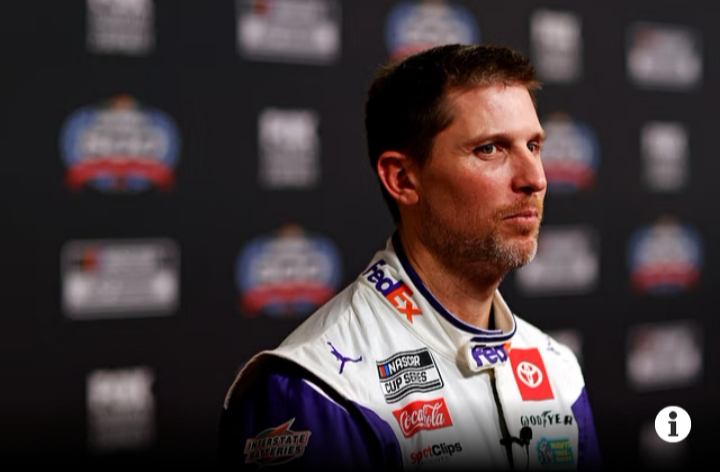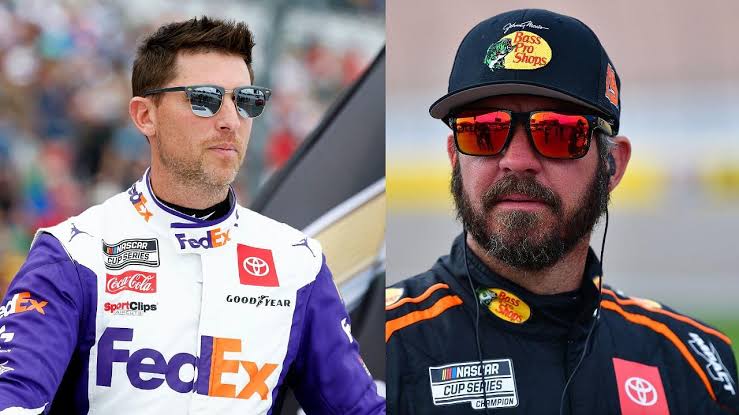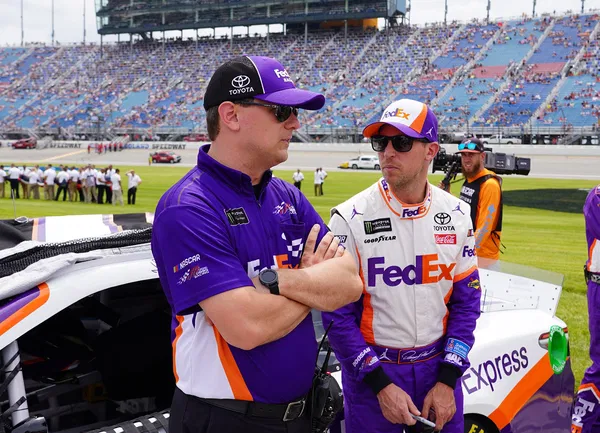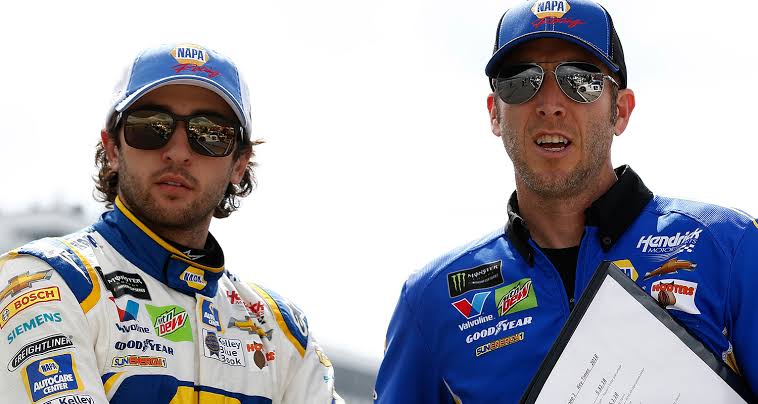Denny Hamlin, a prominent figure in NASCAR, recently expressed his frustration over a significant element of the racing experience: the role of spotters. This sentiment arose after a particularly contentious incident during a race at Richmond, where Hamlin was leading when he was taken out by fellow driver Austin Dillon. To add insult to injury, Dillon went on to secure the victory, leaving Hamlin to reflect on the circumstances that led to his untimely exit from the race.
What particularly drew attention in this scenario was the behavior of Dillon’s spotter, who was audibly heard on the radio urging Dillon to “wreck him” multiple times. This provocative communication raised eyebrows and sparked a broader conversation about the influence of spotters in high-pressure racing situations. During a discussion on the Actions Detrimental podcast, hosted by Hamlin himself, he was asked whether the comments made by spotters can sway a driver’s decisions when the stakes are high. Hamlin did not hesitate to affirm that they indeed have an impact, revealing his increasing dissatisfaction with the current role of spotters in NASCAR.
Hamlin articulated his thoughts candidly, stating, “I’m starting to lean more towards the idea of getting rid of these ridiculous spotters, man.” He acknowledged that while his views might not align with those of the Door Bumper Clear podcast and that a complete elimination of spotters is unlikely—especially for safety reasons at superspeedways—he firmly believes that their incessant chatter should be curtailed. “But they really need to just stop talking, man. They’re not the ones behind the wheel,” he emphasized, highlighting his belief that the drivers should have the autonomy to make decisions without external pressure from spotters.
This incident and Hamlin’s subsequent comments have ignited a debate within the NASCAR community about the evolving role of spotters and their influence on race outcomes. As the sport continues to grow and adapt, the conversation surrounding the necessity and function of spotters is likely to remain a hot topic among drivers, teams, and fans alike.
It’s fascinating how some people think that approach is a valid way to secure a victory. You were on track for a genuine win, but then you faced defeat. Now, you have to come to terms with that setback during the restart. The #22 driver simply outperformed you, and you have to accept that loss, Hamlin remarked.
Hamlin pointed out that while Logano in the #22 rightfully claimed the race on the final restart, “it required no skill” to take out two competitors en route to victory, specifically mentioning Dillon.
He expressed disappointment that Dillon’s triumph was “marred” by those actions, as he had “a rightful win in sight.”
What did Austin Dillon say regarding his spotter’s comments on the radio?
During a conversation with Kevin Harvick on his podcast, Austin Dillon, the winner of the Richmond race, shared his thoughts on his spotter’s demeanor and remarks during the race.
“My spotter was acting like a fanboy last night. It felt like having a #3 superfan trying to commentate while driving the car,” Dillon explained.
Just a few days after Austin Dillon’s hard-fought victory, NASCAR made a significant announcement on Wednesday that sent ripples through the racing community regarding the RCR (Richard Childress Racing) driver. The #3 driver, who had just celebrated his triumph, found himself facing penalties stemming from his controversial actions during the race involving fellow competitors Denny Hamlin and Joey Logano. As a result of these infractions, Dillon was stripped of his playoff eligibility, a decision that has far-reaching implications for his season and future prospects in the championship chase.
Despite the penalties imposed, it is important to note that Dillon’s race win remains intact, along with the associated prize money that comes with such a prestigious victory. This aspect of the ruling highlights the complexity of NASCAR’s disciplinary measures, where the integrity of the race result is preserved even in the face of misconduct.
NASCAR’s Senior Vice President of Competition, Elton Sawyer, took the time to address the media and provide insight into the decision-making process that led to these penalties. He explained that the governing body conducted a thorough review of the incident, utilizing all available data and video footage to assess the situation comprehensively. After careful consideration, they concluded that Dillon had indeed overstepped the boundaries of acceptable conduct on the track. Sawyer emphasized that while NASCAR has a long-standing tradition of aggressive and contact-driven racing, there are limits to what is deemed acceptable behavior, and Dillon’s actions crossed that line.
In a related development, Dillon’s spotter, Brandon Benesch, also found himself in hot water due to his comments made over the radio during the race. His directive to “Wreck him”in reference to another driver drew the ire of NASCAR officials, leading to a three-race suspension for Benesch. This decision underscores NASCAR’s commitment to maintaining a level of decorum and sportsmanship within the sport, as they seek to discourage any behavior that could incite further aggression or endanger the safety of drivers on the track. As the dust settles from this incident, the implications for Dillon and his team are significant.
While he retains his victory, the loss of playoff eligibility could hinder his chances of competing for the championship title this season. The racing community will undoubtedly be watching closely to see how Dillon and RCR respond to these challenges in the coming races.




